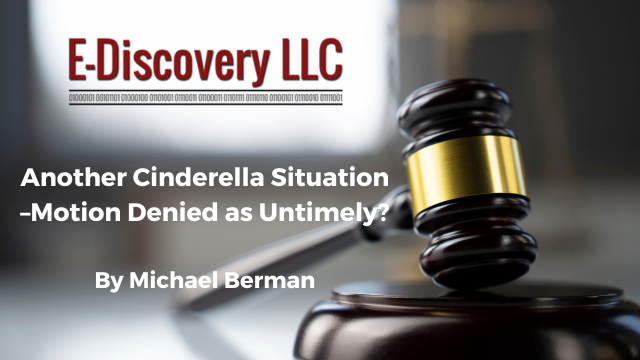
[EDRM Editor’s Note: The opinions and positions are those of Michael Berman.]
In Fiskars Finland OY AB v. Woodland Tools Inc., 2024 WL 2504717 (W.D. Wisc. May 24, 2024), plaintiff sued for alleged misappropriation of trade secrets. Defendants counterclaimed.
A motion to compel production of source code was denied as untimely.
Like Cinderella, the attorney in this case tripped on the electronic stairs at midnight, but his client lost more than a glass slipper.
Tom Donlon, Silly Lawyer Tricks XXX (americanbar.org)(Mar. 14, 2023).
“Like Cinderella, the attorney in this case tripped on the electronic stairs at midnight, but his client lost more than a glass slipper.” Tom Donlon, Silly Lawyer Tricks XXX (americanbar.org)(Mar. 14, 2023).
Courts may rigidly enforce deadlines. See, e.g., Better Late Than Never? Case Dismissed for Filing 16 Minutes After Midnight (Mar. 17, 2023).
On a timely request, the Fiskars court wrote that it “will grant motions to compel production of or access to source code in trade secret cases when the standard is met.”
It added:
In a vacuum, the court would generally be receptive to this request for court intervention. This case is, in part, a trade secret case involving alleged misappropriation of source code, so requests seeking production of source code and related data are an expected part of discovery….
Fiskars Finland OY AB v. Woodland Tools Inc., 2024 WL 2504717 (W.D. Wisc. May 24, 2024)
Then, however, it pointed to a problem:
But Fiskars’ request is not made in a vacuum. Fiskars brought this motion to compel late—over three months after the liability expert disclosure deadline. [emphasis added].
Id.
Fiskars’ delay was prejudicial. The court wrote that, if the motion were granted, Fiskars would have to supplement its liability expert’s report.
And Fiskars would need leave from the court to do so—it conceded as much when it filed a motion seeking to amend the case schedule…. But the court has already denied Fiskars that very relief.… The court will not revisit this ruling via a belated motion to compel.
Id.
The Fiskars court explained that:
The bottom line is this: Even if the court were inclined to compel production of source code and related documents, that information would be unusable in this litigation absent a dramatic upheaval of the schedule…. Here, the burdens associated with the proposed discovery, including re-doing liability expert reports and depositions, are heavy; and the likely benefits, given the elapsed deadlines, are nil. The court will deny Fiskars’ motion for this reason alone.
Id.
In a belts and suspenders decision, the court provided additional reasons for denial. “All this to say, on top of being tardy, Fiskars has not explained how source code beyond that which has already been produced is both relevant and proportionate to the needs of this case, so the court will deny Fiskars’ motion for these additional reasons.”
The court proceeded to resolve a number of other discovery issues.
Perhaps an “excusable neglect” motion, as discussed in Better Late Than Never? Case Dismissed for Filing 16 Minutes After Midnight, might have helped Fiskars, but the disruption and impact on the scheduling order seemed of paramount importance.
Rules of Procedure are the lawyer’s compass and serve to help him [or her] steer through the narrows of pleading, pass the rocks of default, around the shoals of limitation, and safely into the harbor of judgment. It is a reckless sailor, indeed, who puts to sea without a compass, and it is a reckless lawyer who fails to familiarize himself [or herself] with the Rules of Procedure before he [or she] files and tries a case.
Colonial Carpets, Inc. v. Carpet Fair, Inc., 36 Md. App. 583, 584 (1977) (emphasis added)..
The “Rules of Procedure are the lawyer’s compass and serve to help him [or her] steer through the narrows of pleading, pass the rocks of default, around the shoals of limitation, and safely into the harbor of judgment. It is a reckless sailor, indeed, who puts to sea without a compass, and it is a reckless lawyer who fails to familiarize himself [or herself] with the Rules of Procedure before he [or she] files and tries a case.” Colonial Carpets, Inc. v. Carpet Fair, Inc., 36 Md. App. 583, 584 (1977) (emphasis added).
“[R]ules of procedure are not be considered as mere guides or Heloise’s helpful hints to the practice of law, but rather precise rubrics that are to be read and followed….” Id. at 584-85.
Failure to abide by court orders, deadlines, and rules of procedure may lead to dismissal. See Sua Sponte Dismissal Relying in Part on Fed.R.Civ.P. 41(b).
Here, in Fiskars, a potentially viable motion was denied due to prejudicial delay in raising the issue.
For other contexts discussing untimely actions, please see Another Spoliation Motion Denied as Untimely (Mar. 14, 2024); Spoliation Motions Denied as Untimely – Another Wake-Up Call (Sep. 8, 2023); Court Uses an Informal Discovery Procedure to Hold That Untimely Objections Were Waived, and Answers to Interrogatories Defectively Referred to Deposition (Nov. 1, 2023)( untimely discovery objection was waived); cf. Failure to Object to Untimely Interrogatories Coupled With a Discovery Violation Leads to Reversal (Jan. 5, 2024); A Wolf in Sheep’s Clothing: Litigant Can’t Convert a Discovery Dispute Into a Sanctions Motion (Apr. 23, 2024)(“Litigants cannot use a spoliation motion to bring an untimely discovery dispute to the court.”).


